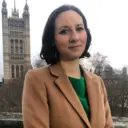Analysis: Hancock gets the awkward jobpublished at 18:21 BST 18 June 2020
 Helen Catt
Helen Catt
Political correspondent
After the prime minister got to announce the good news of a medical breakthrough, the health secretary had the job of fronting up some, well, pretty awkward news.
When the app was first announced, the implication was that it would be a big part of the promised "world-beating" test-and-trace programme.
Over recent weeks the government has progressively stepped back from it, now suggesting it will only "complement" the wider system.
Human contact tracing is tried and tested, and it's true that a well-functioning system can be run without an app.
It's also true that the government is trying to develop a lot of new things in new areas at great speed or, as Hancock put it, "throwing everything at it as fast as we can".
But the failure of this one to work so far will be embarrassing, particularly for a health secretary known for his love of tech-savvy solutions.
Questions are also likely to be asked around the wisdom of the government pushing on with doing its own thing for so long when concerns were already being raised.













